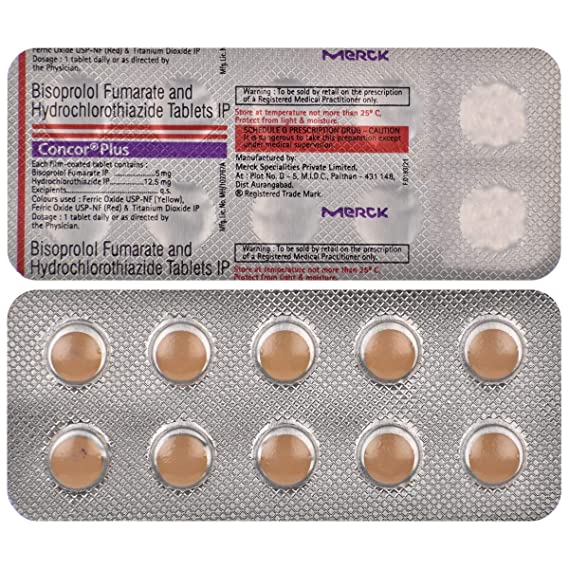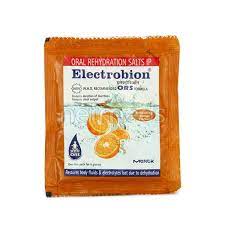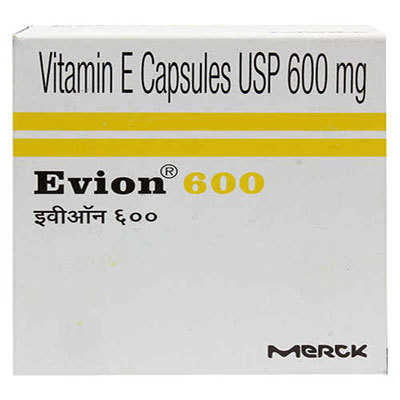Concor Plus 5mg/12.5mg Tablet 10s BISOPROLOL + HYDROCHLOROTHIAZIDE
Concor Plus Tablet is a combination of two medicines that is commonly used for the treatment of hypertension or high blood pressure This medication is especially helpful when a single medication alone is not sufficient in controlling blood pressure In addition it also reduces the risk of future heart attacks and strokes Concor Plus Tablet can be taken with or without food preferably in the morning to prevent frequent urination at night It is important to continue taking this medication as prescribed by your doctor even if you start feeling better This is because high blood pressure often does not have any noticeable symptoms and if you discontinue the medication on your own your condition may worsen To effectively manage your blood pressure it is recommended to engage in regular physical activity maintain a healthy weight and follow a balanced diet These lifestyle changes in combination with Concor Plus Tablet will help to control your blood pressure It is crucial to consult your doctor for proper guidance and advice throughout your treatment with this medication


Are the medicines in combination of Bisoprolol and Hydrochlorothiazide safe to take together?
Potentially significant drug-drug interactions with Bisoprolol and Hydrochlorothiazide include those with other blood pressure medications, which can lead to hypotension, and with drugs that affect heart rate, increasing the risk of bradycardia. Monitoring involves regular blood pressure checks, heart rate monitoring, and periodic blood tests to assess electrolyte levels. Patients should be vigilant for symptoms like dizziness, fainting, or irregular heartbeats and report these to their healthcare provider. Regular follow-up appointments are essential to adjust dosages and manage interactions effectively.

Are there harms and risks from taking combination of Bisoprolol and Hydrochlorothiazide?
Common side effects of Bisoprolol include dizziness, fatigue, and headache, while Hydrochlorothiazide may cause increased urination, electrolyte imbalances, and dizziness. Both medications can lead to low blood pressure, which may result in symptoms like lightheadedness or fainting. Significant adverse effects include bradycardia (slow heart rate) from Bisoprolol and severe dehydration or electrolyte disturbances from Hydrochlorothiazide. Patients should report any unusual symptoms to their healthcare provider, as these medications can also interact with other drugs, potentially leading to more serious side effects.

Can I take combination of Bisoprolol and Hydrochlorothiazide if I am pregnant?
Bisoprolol and Hydrochlorothiazide should be used during pregnancy only if the potential benefits justify the risks to the fetus. Hydrochlorothiazide crosses the placenta and may cause fetal or neonatal jaundice, thrombocytopenia, and other adverse effects. Bisoprolol's effects on pregnancy are not well-studied, but beta-blockers can potentially affect fetal growth and development. Pregnant women should discuss the risks and benefits with their healthcare provider to determine the most appropriate treatment for hypertension during pregnancy.

Can I take combination of Bisoprolol and Hydrochlorothiazide while breastfeeding?
Bisoprolol and Hydrochlorothiazide are generally not recommended during breastfeeding due to the potential for adverse effects on the nursing infant. Hydrochlorothiazide is known to be excreted in breast milk and may affect milk production or cause electrolyte imbalances in the infant. Bisoprolol is also excreted in small amounts in breast milk, and its effects on the infant are not well-studied. If treatment with these medications is necessary, alternative feeding options should be considered, and the decision should be made in consultation with a healthcare provider.

Can I take combination of Bisoprolol and Hydrochlorothiazide with other prescription drugs?
Significant drug interactions with Bisoprolol and Hydrochlorothiazide include those with other antihypertensive agents, which can lead to excessive lowering of blood pressure. Nonsteroidal anti-inflammatory drugs (NSAIDs) may reduce the effectiveness of Hydrochlorothiazide. Concurrent use with other beta-blockers or medications that affect heart rate can increase the risk of bradycardia. Additionally, combining with drugs that affect electrolyte balance, such as corticosteroids, can exacerbate electrolyte disturbances. Patients should inform their healthcare provider of all medications they are taking to manage potential interactions effectively.

For how long is combination of Bisoprolol and Hydrochlorothiazide taken?
The typical duration of use for Bisoprolol and Hydrochlorothiazide is long-term, as they are used to manage chronic conditions like hypertension. Both medications are intended for continuous use to maintain blood pressure control and prevent complications associated with high blood pressure. Patients are advised to take these medications daily, even if they feel well, as stopping them suddenly can lead to serious heart problems. The duration of therapy is determined by the healthcare provider based on the patient's response and overall health condition.

How does combination of Bisoprolol and Hydrochlorothiazide work?
Bisoprolol works by blocking beta-1 adrenergic receptors in the heart, which slows the heart rate and reduces the force of heart contractions, leading to lower blood pressure. Hydrochlorothiazide acts as a diuretic, promoting the excretion of excess sodium and water through urine, which decreases blood volume and also helps lower blood pressure. Together, these medications provide a dual approach to managing hypertension by reducing cardiac output and blood volume, effectively lowering blood pressure and reducing the risk of cardiovascular events.

How does one take combination of Bisoprolol and Hydrochlorothiazide?
Bisoprolol and Hydrochlorothiazide can be taken with or without food, but it is important to take them at the same time each day to maintain consistent blood levels. Patients should follow their healthcare provider's instructions regarding diet, which may include a low-salt or low-sodium diet to enhance the medication's effectiveness. Additionally, they may be advised to consume potassium-rich foods, such as bananas and orange juice, to counteract potential potassium loss from Hydrochlorothiazide. It's important to avoid alcohol, as it can increase certain side effects like dizziness.

How do I know if combination of Bisoprolol and Hydrochlorothiazide is working?
The benefit of Bisoprolol and Hydrochlorothiazide is primarily assessed by monitoring blood pressure levels. Regular blood pressure checks help determine the effectiveness of the medication in controlling hypertension. Additionally, healthcare providers may evaluate heart rate, kidney function, and electrolyte levels to ensure the medications are working effectively and safely. Patients may also be asked to report any symptoms or side effects they experience, which can provide further insight into the treatment's efficacy and tolerability.

How do I store combination of Bisoprolol and Hydrochlorothiazide?
Bisoprolol and Hydrochlorothiazide do not require refrigeration. They should be stored at room temperature, away from excess heat and moisture, and kept in their original container with the lid tightly closed. It is important to keep these medications out of reach of children and pets to prevent accidental ingestion. Proper storage ensures the medication remains effective and safe for use throughout its shelf life.

How effective is combination of Bisoprolol and Hydrochlorothiazide?
Clinical studies have demonstrated that the combination of Bisoprolol and Hydrochlorothiazide effectively reduces blood pressure in patients with hypertension. Bisoprolol, as a beta-blocker, has been shown to decrease heart rate and cardiac output, contributing to lower blood pressure. Hydrochlorothiazide, a diuretic, enhances this effect by reducing blood volume through increased urine output. Together, they provide an additive effect, improving blood pressure control more effectively than either medication alone. The combination has been proven effective across different age groups, races, and genders, making it a versatile option for managing hypertension.

How long does it take for combination of Bisoprolol and Hydrochlorothiazide to work?
Bisoprolol and Hydrochlorothiazide, when used together, typically start to show effects within a few hours of administration. Bisoprolol, a beta-blocker, works by slowing the heart rate and relaxing blood vessels, which can help lower blood pressure relatively quickly. Hydrochlorothiazide, a diuretic, helps reduce fluid retention by increasing urine output, which also contributes to lowering blood pressure. While the initial effects can be observed within hours, it may take a few weeks to experience the full benefits of the combination therapy. Both medications work together to effectively manage hypertension by addressing different physiological pathways.

What disease or symptom is combination of Bisoprolol and Hydrochlorothiazide used for?
Bisoprolol and Hydrochlorothiazide are primarily indicated for the treatment of hypertension (high blood pressure). Bisoprolol may also be used to manage heart failure and other heart-related conditions due to its ability to reduce heart rate and workload. Hydrochlorothiazide is additionally used to treat edema (fluid retention) associated with heart, kidney, or liver disease. Together, they provide a comprehensive treatment for hypertension by addressing both cardiac function and fluid balance in the body.

What is combination of Bisoprolol and Hydrochlorothiazide?
Bisoprolol and Hydrochlorothiazide are commonly used together to treat high blood pressure (hypertension). Bisoprolol is a beta-blocker that works by slowing the heart rate and relaxing blood vessels, which helps to lower blood pressure. Hydrochlorothiazide is a diuretic that helps reduce fluid retention by increasing urine output, further aiding in blood pressure reduction. Together, they provide a comprehensive approach to managing hypertension by targeting different mechanisms in the body.

What is the usual dose of combination of Bisoprolol and Hydrochlorothiazide?
The usual adult daily dose for Bisoprolol is typically between 2.5 mg to 20 mg, depending on the patient's condition and response to the medication. Hydrochlorothiazide is usually prescribed in doses ranging from 12.5 mg to 50 mg per day. When combined, the doses are adjusted to achieve optimal blood pressure control while minimizing side effects. The combination tablets are available in different strengths, such as 2.5 mg/6.25 mg, 5 mg/6.25 mg, and 10 mg/6.25 mg of Bisoprolol and Hydrochlorothiazide, respectively. The specific dose is determined by the healthcare provider based on individual patient needs.

Who should avoid taking combination of Bisoprolol and Hydrochlorothiazide?
Important warnings for Bisoprolol and Hydrochlorothiazide include the risk of severe hypotension, bradycardia, and electrolyte imbalances. Bisoprolol should be used cautiously in patients with asthma or other respiratory conditions due to potential bronchospasm. Hydrochlorothiazide can cause photosensitivity and should be used with caution in patients with a history of sulfa allergy. Both medications are contraindicated in patients with severe renal impairment or anuria. Patients should be monitored for signs of heart failure, and abrupt discontinuation should be avoided to prevent rebound hypertension or angina.













.svg)
